A book by David Kelsey is always eagerly anticipated among theologians. Kelsey is the father, grandfather, and now great-grandfather of many like myself who trained as professional theologians in the American context. His densely packed arguments often attend to matters of pastoral concern.
By my read, the slim volume Imagining Redemption serves both as the best introduction to and example of Kelsey’s work. In it, Kelsey considers first the common usage of a word—“redemption”—that is critical to theological discourse, but that also carries with it valences of meaning in the English language. Kelsey works to disentangle what the word means in its common usage from what it means in its theological usage. This “disentangling” allows Kelsey to then reload the word with a properly theological meaning—based on his canonical reading of Scripture and his understanding of traditional deployments of Christian doctrine. In this way, Kelsey’s theological approach is a regulative, grammatical one more than an apologetic or confessional one; he begins with language to consider how we might say truer things with theological language. But he does not attempt to persuade that the theological claims he makes are true, nor does he rely on Scripture or tradition as a weightier hand to harden his answers. Indeed, his more modest approach seeks to strip back an overly used word of its cultural and theological accretions so that we might imagine what it actually means.
Kelsey’s method differs from that of many more conservative theologians in that it starts not with “what Scripture says is true about God”; but with a much more minimalist method that views theology as a self-regulating enterprise that once undertaken can then serve to regulate the worship of the church. Kelsey’s approach differs from much academic theology due to its deep commitment to both Scripture and the church.Properly Christian theology might allow God’s self-revelation to generate the questions that we then ask of God. But many more evangelical theological types will reject Kelsey’s work because he does not assume Scripture’s authority. He rather demonstrates how it functions as an authority for Christian worship.
This discussion of Kelsey’s method is important because this method, applied to the problem of human suffering, yields a book that is distinctively David Kelsey, with both its benefits and failures. The benefit is a measured, thoroughly theological (both traditional, doctrinal, and biblical) approach to the question of suffering. But the failure, as I see it, is that Kelsey starts with a question that is produced by human speech, and so a question that is thoroughly anthropological. Theology is of course always human speech about God—this is another thing that David Kelsey himself insists upon! And yet, at least for my own constructive projects, theology should seek to be “human speech about God” that takes as its questions the questions that God’s self-revelation generate. Put another way, theology is human speech about God, but not merely humans talking about their own concerns and then asking God what he has to do with them. Rather properly Christian theology might allow God’s self-revelation to generate the questions that we then ask of God.
This is the chief place where, in my mind, Human Anguish and Divine Power fails. But first to the argument Kelsey makes, and then to my evaluation of its limited success.
“Everything Happens for a Reason”
Kelsey takes the consoling truism “everything happens for a reason” and considers it both as untrue and not all that consoling. The problems with such a truism are so oft-rehearsed as to be quite tired: If God is all-powerful, and God is all-good, then the bad things that happen must in some way come from God’s hand. Theologians may choose among bad options: God lacks power or God is not good—or most fatally, there is no “reason” for which terrible things occur.
Kelsey seek to cut this cord of correlation at the “all-powerful” link. Such a move in itself is not novel. Many modern theologians have pursued renovated conceptions of divine power,Kelsey reconsiders the “canonical shape” of God’s power, not as a single strand but as a braid of three inseparable but irreducibly different sorts of narrative. perhaps most notably the process theologians who consider power not as some quantitative reality that God holds—the power to wield change and determine outcomes—but as God’s guiding love that unfolds alongside creation in time.
Kelsey also seeks to differentiate what we mean by “God’s power”; but he does so in a way that is much more consistent with the Christian tradition. Kelsey reconsiders the “canonical shape” of God’s power, not as a single strand but as a braid of three inseparable but irreducibly different sorts of narrative: “God actively relating in importantly different concrete ways to create, to reconcile estranged creatures, and to draw creatures to eschatological consummation” (p. xi). Power is not to be understood only as the unrestrained and unqualified power that God uses to create ex nihilo (p. 209). Rather God also acts in creative blessing and with the promise of eschatological consummation (which is not a guarantee—an interesting excursus of Kelsey worth a few thousand words).
“Creative blessing” is different from “promise making and keeping” in that it is a steady on-going state and expresses God’s glory in unconditioned ways. It is also free, ordered to the good, and nonviolent. Though Kelsey is here trying to differentiate the kinds of power God utilizes—ex nihilo power from “creative blessing”—one begins to feel already that Kelsey doth protest too much. Though certainly teasing out the characteristic of “creative blessing” grants us a useful glimpse at the divine attributes, it also could line up with the second aspect of God’s providence sometimes called concursus. Kelsey does draw early on this three-fold distinction from the Reformed tradition (conservatio, concursus, gubernatio). I am simply not persuaded that divvying up the ways in which God acts powerfully unlinks the difficulty between God’s goodness and power in the way Kelsey argues that it does.
The second aspect of Kelsey’s theological method draws on traditional Reformed categories to offer some “controlling” inferences to our discussion of divine power. Kelsey seems to think that conceptions of power often direct conceptions of sovereignty and glory (working I think in this direction: poweràsovereigntyà glory). Kelsey wants to reroute the ship in the opposite direction. All of this relies on a theological idea that Kelsey assumes is operative that I am not sure about; namely, that theological concepts “work” in particular ways based on how the “concept” functions. Kelsey has done quite little to demonstrate the operative concept of power that he is trying to interrogate beyond a few quoted truisms in the opener (“everything happens for a reason”). Are we willing to write an entire book to interrogate a truism (“theologically and pastorally problematic talk”) that sophisticated theologians don’t hold? Is Kelsey mostly here arguing with himself?
Kelsey is also very concerned that sovereignty is not “control.” Control would be exercised over or against creatures and could violate their integrity.The base concern is that popular conceptions of God’s power do not yield pastorally harmful theology. Sovereignty is exercised within creation—regulated by God’s existence as triune, which self-regulates God’s actions as in the nature of creative blessing. All of this is clear in part because Kelsey keeps repeating it.
The third feature of Kelsey’s theological method is drawing on the ways words accrue unintentional meanings that may set the work of pastoral theology adrift. For Kelsey, the word “power” is often used in a conventional way that may limit proper theological understandings of what power is. This is also a distinctive move of Kelsey, best expounded by Kathryn Tanner. Kelsey articulates a non-competitive/ non-contrastive understanding of divine power, and then draws on Thomas Aquinas to remind readers that the “who” and “what” God is are not separate; indeed, God acts out of God’s own self-identity, and might not do otherwise. Affirmations of God’s power therefore must always be vested in divine love.
The base concern is that popular conceptions of God’s power do not yield pastorally harmful theology. Popular conceptions of power understand power as control; in human terms, this yields an image of God harnessing and then directing the acts of the world as I would leash and direct a dog. Such a view makes God indirectly a) in charge of and b) accountable for each of the dog’s actions. Such a view limits the dog’s ability to exercise his freedom, sees to it that God’s ends are achieved, but also holds God responsible for whatever bad outcomes the dog finds himself in (muddy puddle, natch).
Bad Consolation, Bad Theology
Kelsey’s arguments are notoriously layered. His Eccentric Existence took a triple helix as an argumentative structure, and one feels the same three-stranded cord at work here. But frankly, such an approach does not always serve his argument. A more fluent book would fashion all three strands into a braid, emphasizing the way they serve one single argument.
What Kelsey is doing is attempting to weave Reformed conceptions of God’s glory and sovereignty with biblical conceptions of God’s power and theological notions of God’s identity.Throughout Kelsey there is a common-sense assumption that a truism that is pastoral malpractice must be theologically faulty as well. He wants the braid that results, however, to address a question that is deeply rooted in human emotions. Of course, questions about human suffering are never only emotional, but there is a mismatch in crafting a careful argument to answer a question that could never be answered with an argument.
The problems with many views of God’s power are perennial. Kelsey’s chief concern is that they lead to the casual “everything happens for a reason,” which is bad theology and worse consolation. There is a bigger question here concerning the relation between “bad consolation” and “bad theology.” Throughout Kelsey there is a common-sense assumption that a truism that is pastoral malpractice must be theologically faulty as well. But here the function of consolation and the function of theological claims must be clarified. There is such a thing, after all, as false consolation—you don’t look a day over thirty!—which is based on how we want other people to feel, not necessarily on what is true. A truism of pop advice is that bad feelings are to be avoided or numbed. (COVID-19 is here to stay but the markets are great!) Thesis: The further one moves from biblical authority, the further this popular truism (“bad feelings are bad”) becomes enshrined in theological interpretation.
False consolation seeks to make the listener feel better by reminding them that things could be worse or that their state of affairs is neither their fault nor God’s. But is it not worse if God’s hand is absent in our suffering? To remove God from acting in and through a diagnosis is not, of course, the same as saying that God caused a state of events. The perennial question that Kelsey takes up is the “everything happens for a reason,” the assumption that God cannot be in charge of such evil happening to creatures. My perennial concern is: Is it not worse if he isn’t?
Whether We Live or Die
It was a small cancer and a “good” one, my surgeon said, which made me question his facility with language. They removed it, I take medication daily and scans yearly—I am “fine,” it will not recur. But I held my son that moment they told me—he was six weeks old—and felt my entire heart shatter in two. Someone else’s milk fed him while I was in surgery. I passed him over for a time to another’s care. I have recovered from the cancer but I will never recover from that.
My outcome was good, but had it not been, I think I would need to believe that, too, was God’s will, that God’s fierce kindness would hold me toward a greater end of friendship with God that would separate me from the best thing that he had ever given me in this life. This is the difficulty of rowing the River Styx, between the most beautiful things we can know in this life—a little boy’s tousled morning hair, the unexpected chirp of an infant, the impossible reasons they leave their socks everywhere in the house, and the promised-more-beautiful life to come, which we have yet to see. Christian faith just is harnessing the imagination to hope that the life to come is more than this. It is so terrible to imagine that everything, even illness that might separate us from what we love, might happen at God’s hand. But to imagine that it does not would be worse.
It is indeed false consolation to say that “all things happen for a reason” and so are Good. But it may be false consolation, too, to say that anything might happen apart from God’s chief ordering of all creation toward their end in God. True consolation, it seems, is simply Romans 14:8—“whether we live or die we belong to the Lord.” A chief goal of systematic theology yielded to a life of prayer is to allow that to be consolation enough.
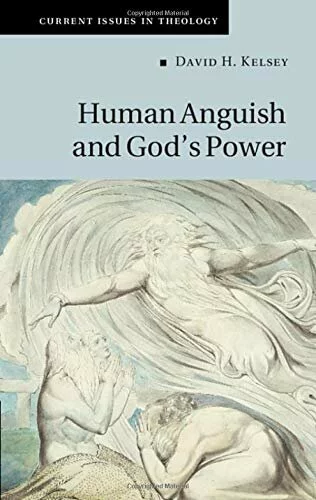
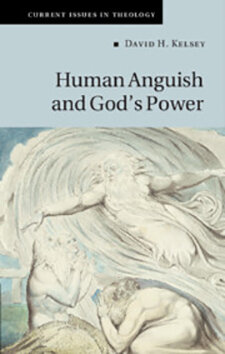


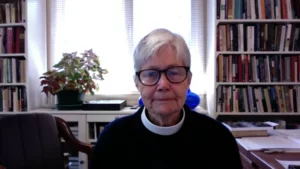
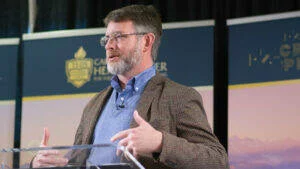

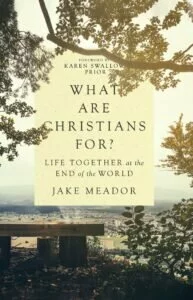
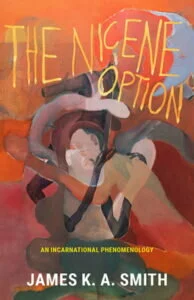
Comments
Be the first one to make a comment!